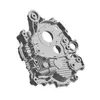Mobile:+86-311-808-126-83
Email:info@ydcastings.com
sludge pump impeller
Understanding Sludge Pump Impellers
Sludge pumps play a critical role in various industrial applications, especially in wastewater treatment and mining sectors. One of the essential components of a sludge pump is its impeller, which significantly influences the pump's efficiency, capacity, and overall performance. This article will delve into the importance of sludge pump impellers, their design features, and factors to consider when selecting one for specific applications.
What is a Sludge Pump Impeller?
An impeller is a rotating component within a pump designed to transfer energy from the motor to the fluid, thereby promoting fluid movement. In the case of sludge pumps, the impeller is specifically engineered to handle viscous, abrasive, and often solid-laden fluids such as sewage or mining waste. The complexity of these fluids—characterized by their high density and particulate content—demands that impellers be robust and capable of withstanding wear and tear over time.
Design Features of Sludge Pump Impellers
Sludge pump impellers come in various designs, each tailored to meet the performance needs of specific applications
. Common types include1. Open Impellers These impellers lack a shroud and are suitable for handling fluids with high solid content. Because they are less prone to clogging, open impellers are ideal for wastewater applications.
2. Closed Impellers Enclosed by two shrouds, closed impellers provide better hydraulic efficiency and are generally used for less viscous fluids. While they may struggle with high solids concentrations, advancements in design have improved their performance in partially contaminated fluids.
3. Semi-Open Impellers These are a hybrid of open and closed designs, offering a balance between efficiency and solid-handling capabilities, making them versatile for varied sludge applications.
sludge pump impeller

Factors to Consider When Selecting a Sludge Pump Impeller
When choosing an impeller for a sludge pump, several critical factors must be taken into account
- Fluid Characteristics Understanding the properties of the sludge—such as solids content, viscosity, and temperature—is vital. Different impeller designs may perform better under specific conditions.
- Wear Resistance Given the abrasive nature of many sludge compositions, the material of the impeller should be durable. Common materials include cast iron, stainless steel, and even composite materials designed to resist corrosion and wear.
- Efficiency The hydraulic design of the impeller will influence the pump’s efficiency. A well-designed impeller can significantly reduce energy consumption, leading to lower operating costs over time.
- Pump Size and Capacity The size of the impeller must match the pump’s overall design characteristics, ensuring that the system can handle the desired flow rates and pressure heads.
Conclusion
In the realm of sludge management, selecting the appropriate impeller is crucial for ensuring optimal pump performance. With a thorough understanding of the characteristics of the sludge, along with the inherent design features of different impellers, operators can make informed decisions that enhance efficiency, durability, and operational cost-effectiveness in their sludge pumping systems. Ultimately, investing time and resources into the right sludge pump impeller selection can lead to smoother operations and significant long-term benefits.
-
What Makes Stainless Steel Pump Casting Essential for Modern Industries?NewsJul.14,2025
-
Revolutionize Your Engine Maintenance with Premium Aluminum and Cast Iron ComponentsNewsJul.14,2025
-
Precision Flow Engineering Starts with the Right Pump ComponentsNewsJul.14,2025
-
Maximize Efficiency: Explore Reliable Containment and Crop SolutionsNewsJul.14,2025
-
Discover Superior Performance with Advanced Turbo ComponentsNewsJul.14,2025
-
Boost Fluid Dynamics with Precision-Engineered Pump ComponentsNewsJul.14,2025











